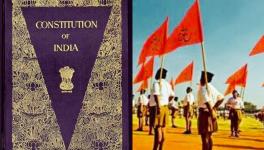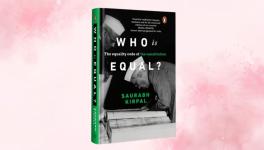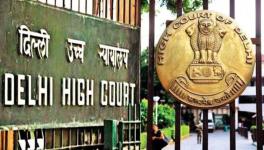UAPA: Entrenching a Regime of Suspicion

Image courtesy: Penguin
Explicating what it means to be a minority in majoritarian times, The Minority Conundrum, edited by Tanweer Fazal is the second volume in the "Rethinking India" series by Penguin Random House India in association with the Samruddha Bharat Foundation (SBF). Identifying vulnerabilities that encumber the quest for the realisation of substantive citizenship by minority groups, the essays in this anthology deal with a vast range of issues including educational attainments, employment prospects in a liberalised economy, violence of the state and vigilante groups, emerging questions of citizenship, and the receding political voice of minorities amidst a majoritarian upswing.
The following is an excerpt from Manisha Sethi's essay, "The Violence of Law", of the book. Through the essay, Sethi shows us the workings of laws like TADA, POTA and UAPA, and how they tend to reify communities and assign properties to social groups.
UAPA Fortified
As evidence of its malfeasance piled up, the UPA repealed POTA when it assumed office in 2004, but in a sleight of hand, bled many of its harshest provisions—barring the admission of custodial confession as evidence—into the pre-existing Unlawful Activities Prevention Act. A chapter on terrorism was added, and through subsequent amendments in 2008 and 2012 it has been further made to resemble the dreaded POTA. There is then the story of how a fortified UAPA has extended all that was wrong with POTA and earlier TADA, erasing in one stroke the history of resistance against these laws. Here though I want to cast my focus on how the seemingly benign sections of UAPA that came into existence in 1967 have unintentionally or otherwise proven vital in consolidating and naturalizing the connections between Islam and terrorism.
Section 3 of UAPA empowers the government to proscribe an organization if it came to form an opinion that its activities and objectives were secessionist, it promoted enmity between different groups of people, or was prejudicial to national integration. While earlier the ban was to be valid for two years, requiring the executive to furnish new grounds for imposing a fresh ban at the end of those two years, the law was amended in 2012 to extend the period of the ban to five years. So first, this law provides the government sweeping powers to curb peoples’ right to association for prolonged periods, and second, this power can be mobilized on the basis of the ideological and subjective understanding of what constitutes national interest and what comprises anti-national or secessionist activity and objectives.
Section 10 of the law lays out the penalty for continuing to ‘be a member of an association declared unlawful by a notification issued under Section 3’; Section 13 delineates the punishment for assisting in ‘any unlawful activity of any association declared unlawful under Section 3’. We may add here that the amended UAPA in 2008 brought into being Section 20 which states that ‘any person who is a member of a terrorist gang or a terrorist organization, which is involved in terrorist act, shall be punishable with imprisonment for a term which may extend to imprisonment for life, and shall also be liable to fine’. As the Bombay High Court noted in 2013, this is very equivocally worded, and if interpreted narrowly, it could be in conflict with Article 19 of the Indian Constitution.1
UAPA thus provides an iron legal framework for pronouncing guilt by association, and the law itself lends to be used for purpose beyond its statement of objects, and is liable to be misused. It is indeed the state’s position in the course of trials that under the provisions of UAPA, ‘the mere association with the members of the said Organization and the mere possession of the literature/material propagating the philosophy or ideology of the said organization amounted to an offence’.2 Hence, people can be arrested on the basis of merely an accusation that they are members of a banned outfit even if they have not participated in any violence. These are not merely procedural infirmities. The courts’ occasional warnings that prosecution and agencies must differentiate between active and passive membership, and mere membership and sympathy cannot be grounds for criminalization3 are only feeble safeguards against how these cases are prosecuted and tried.
Moreover, one must remember here too that the definition of unlawful activity as ‘an act or by words, either spoken or written, or by signs or by visible representation or otherwise’ itself is so wide as to render possibly any human activity as suspect. My concern, therefore, is that anything that the government does not approve of could have the potential of being consigned to the overflowing category of unlawful.
[…]
Entrenching a Regime of Suspicion
When UAPA was amended in the immediate aftermath of the Mumbai carnage in November 2008, it was given more teeth, including extended periods of detention, allowing prosecution greater leverage to file delayed charge sheets, designating an increasing circle of acts as ‘terrorist’. L.K. Advani, the BJP’s leader in the Opposition, lamented that it still lacked POTA’s power, namely allowing confessions made before police officers admissible as evidence.4 The Gujarat government had tried repeatedly, unsuccessfully, to promulgate the Gujarat Control of Organized Crime Act (GUJCOCA) on the lines of the dreaded MCOCA, in order to have at its disposal a law that could short circuit constitutional principles and protections afforded to all citizens against the brute might of the state. Passed originally in the Gujarat Assembly in 2003, GUJCOCA provided for custodial confessions and intercepted telephone conversations as admissible evidence, and was returned thrice between its passage and 2009. In 2015, it was renamed the Gujarat Control of Terrorism and Organised Crime Act and passed again by the state assembly, receiving finally presidential assent in November 2019.5 One might dismiss as election bombast former home minister Rajnath Singh’s speech during the course of an election rally at Mirzapur in Uttar Pradesh that upon their return to power in 2019, the new government would enact a sedition law so stringent that it would send shivers down the spine of ‘anti-nationals’,6 but it is of a piece with the party’s idea of a muscular state, its implicit disdain for civil liberties and individual freedoms. Certainly, the most recent amendments to UAPA passed in the very first parliamentary session after the new government took office herald an even harsher punitive regime of suspicion. In August 2019, Parliament agreed to grant the government powers to designate individuals as terrorists under a fourth schedule—even before any charges have been brought against them, and before any judicial process has indicted them of wrongdoing.7
Relentless arrests and their reportage—especially of those belonging to a particular community—bolster the perception of the nation being under siege, of dark conspiracies being afoot, thus justifying the application of extraordinary laws, legitimizing the robbing of our rights. Indeed, they move us to acquiesce to the erosion of our own rights for the larger good of the nation. But they also further culture wars, by filling the threatening figure with ethnic markers and telling us—sometimes subtly, but mostly rather crudely—as to who constitutes the authentic national, and who endangers that pure nation.
1. Bail order of the Bombay High Court in criminal bail applications 1536, 1634 and 1692 of 2012, 31 January 2013.
2. Special Public Prosecutor’s arguments; see Ibid,14.
3. State of Kerala v. Raneef, https://main.sci.gov.in/jonew/judis/37314.pdf.
4. Lok Sabha Proceedings, Fourteenth Series, Vol. XXXVI, Wednesday, 17 December 2008. Accessible at: http://164.100.47.194/debatestext/14/17-12-2008.pdf.
5. PTI, ‘Controversial Gujarat Anti-terror Law Gets President Assent on 4th Attempt’, India Today, 5 November 2019, https://www.indiatoday.in/india/story/gujarat-anti-terror-law-president….
6. PTI, ‘Will Make Sedition Law More Stringent, Says Rajnath Singh’, India Today, 15 May 2019, https://www.indiatoday.in/elections/lok-sabha-2019/story/will-make-sedi….
7. The Unlawful Activities (Prevention) Amendment Act, 2019 (No. 28 of 2019). Gazette of India notification, 8 August 2019.
This is an excerpt from The Minority Conundrum: Living in Majoritarian Times edited by Tanweer Fazal and published by Penguin Random House India. Republished here with permission from the publisher.
Manisha Sethi teaches at Jamia Millia Islamia, New Delhi. She is the author of Escaping the World: Women Renouncers among Jains (Routledge, 2012) and Kafkaland: Law, Prejudice and Counterterrorism in India (Three Essays Collective, 2014).
Courtesy: Indian Cultural Forum
Get the latest reports & analysis with people's perspective on Protests, movements & deep analytical videos, discussions of the current affairs in your Telegram app. Subscribe to NewsClick's Telegram channel & get Real-Time updates on stories, as they get published on our website.
























